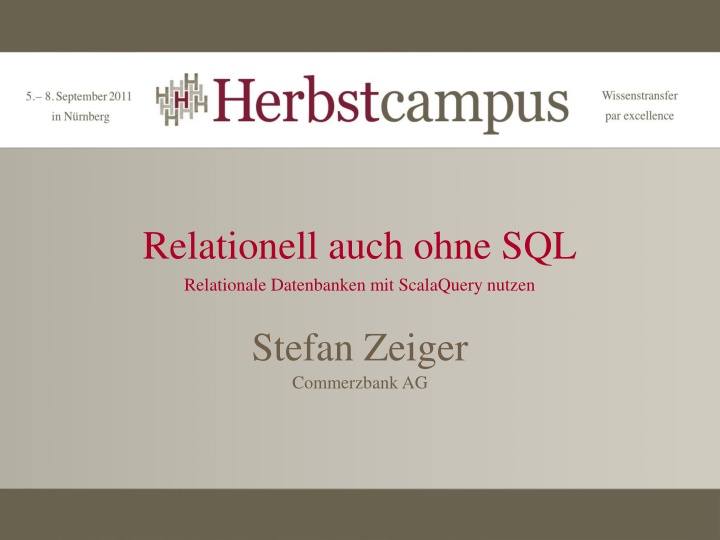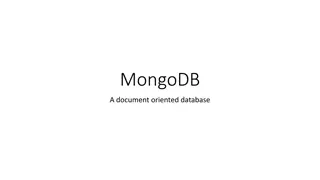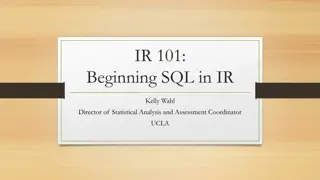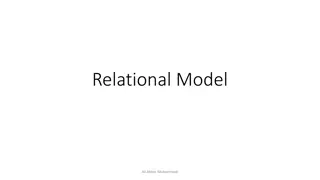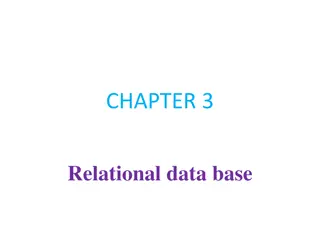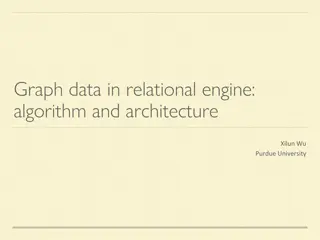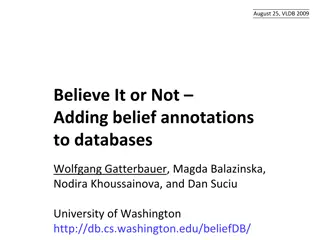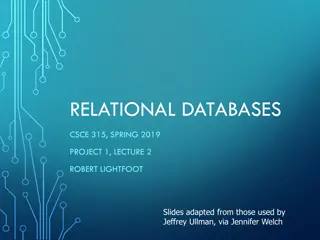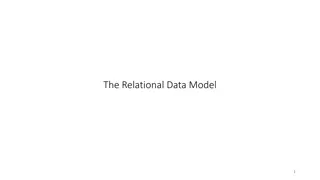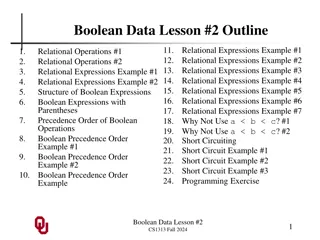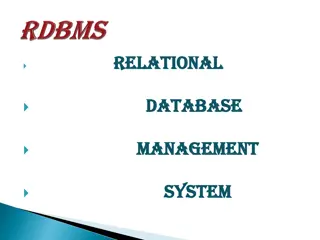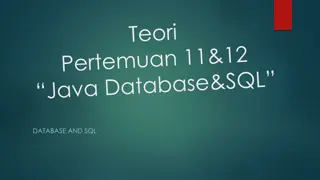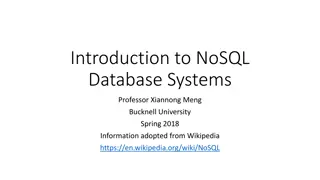Using ScalaQuery to Work with Relational Databases
When working with relational databases without SQL, ScalaQuery can be a powerful tool. This approach offers a different perspective on interacting with databases, providing flexibility and efficiency. By leveraging ScalaQuery, developers can simplify database operations and enhance the overall performance of their applications. This method allows for seamless integration with relational databases, enabling smoother data access and manipulation. Explore the possibilities of ScalaQuery for a streamlined database experience.
Download Presentation

Please find below an Image/Link to download the presentation.
The content on the website is provided AS IS for your information and personal use only. It may not be sold, licensed, or shared on other websites without obtaining consent from the author.If you encounter any issues during the download, it is possible that the publisher has removed the file from their server.
You are allowed to download the files provided on this website for personal or commercial use, subject to the condition that they are used lawfully. All files are the property of their respective owners.
The content on the website is provided AS IS for your information and personal use only. It may not be sold, licensed, or shared on other websites without obtaining consent from the author.
E N D
Presentation Transcript
Relationell auch ohne SQL Relationale Datenbanken mit ScalaQuery nutzen Stefan Zeiger Commerzbank AG
Relationale Datenbanken Gr ere Anwendungen brauchen oft Datenbanken Relationales Modell verhindert Silobildung Herbstcampus 2011 Relationell auch ohne SQL 2
Wozu? Wir haben doch JDBC Herbstcampus 2011 Relationell auch ohne SQL 3
Wozu? Wir haben doch JDBC def usersMatching(pattern: String)(conn: Connection) = { val st = conn.prepareStatement("select id, name from users where name like ?") try { st.setString(1, pattern) val rs = st.executeQuery() try { val b = new ListBuffer[(Int, String)] while(rs.next) b.append((rs.getInt(1), rs.getString(2))) b.toList } finally rs.close() } finally st.close() } Class.forName("org.h2.Driver") val conn = DriverManager.getConnection("jdbc:h2:test1") try { println(usersMatching("%zeiger%")(conn)) } finally conn.close() Herbstcampus 2011 Relationell auch ohne SQL 4
JDBC Gute Grundlage f r Frameworks Zu niedrige Abstraktionsebene f r Anwendungen Herbstcampus 2011 Relationell auch ohne SQL 5
ScalaQuery: Simple Queries val usersMatching = query[String, (Int, String)] ("select id, name from users where name like ?") Database.forURL("jdbc:h2:test1", driver = "org.h2.Driver") withSession { println(usersMatching("%zeiger%").list) } Herbstcampus 2011 Relationell auch ohne SQL 6
Object/Relational Mapping Tools Hibernate, Toplink, JPA 95% Wozu? Wir haben doch ORMs L sen des Problems 80% 50% Herbstcampus 2011 Relationell auch ohne SQL 7
Relationales Modell Relational Model: COF_NAME Colombian French_Roast Espresso Colombian_Decaf French_Roast_Decaf SUP_ID PRICE 7.99 8.99 9.99 8.99 9.99 101 49 150 101 49 Relation Attribute Tuple TABLE COFFEES Relation Value Relation Variable Beispiele aus: http://download.oracle.com/javase/tutorial/jdbc/basics/index.html Herbstcampus 2011 Relationell auch ohne SQL 8
Impedance Mismatch: Konzepte Object-Oriented: Relational: Identity Identity State State : Transactional Behaviour Behaviour Encapsulation Encapsulation Herbstcampus 2011 Relationell auch ohne SQL 9
Impedance Mismatch: Retrieval Strategies Colombian French_Roast Espresso Colombian_Decaf French_Roast_Decaf Espresso Price: Supplier: 9.99 The High Ground select c.*, s.SUP_NAME from COFFEES c, SUPPLIERS s where c.COF_NAME = ? and c.SUP_ID = s.SUP_ID select COF_NAME from COFFEES Herbstcampus 2011 Relationell auch ohne SQL 10
Impedance Mismatch: Retrieval Strategies Herbstcampus 2011 Relationell auch ohne SQL 11
Impedance Mismatch: Retrieval Strategies def getAllCoffees(): Seq[Coffee] = def printLinks(s: Seq[Coffee]) { for(c <- s) println(c.name ) } + " " + c.price def printDetails(c: Coffee) { println(c.name) println("Price: " + c.price) println("Supplier: " + c.supplier.name) } Herbstcampus 2011 Relationell auch ohne SQL 12
O/R-Mapper Falsche Abstraktionsebene Nicht transparent Herbstcampus 2011 Relationell auch ohne SQL 13
Object/Relational Mapping is The Vietnam of Computer Science (Ted Neward) http://blogs.tedneward.com/2006/06/26/The+Vietnam+Of+Computer+Science.aspx Herbstcampus 2011 Relationell auch ohne SQL 14
A Better Match: Functional Programming caseclass Coffee(name: String, supplierId: Int, price: Double) Relation Attribute val coffees = Set( Coffee("Colombian", 101, 7.99), , Coffee("Espresso", 150, 9.99) ) Coffee("French_Roast", 49, 8.99) Tuple Relation Value - mutable state in the DB Relation Variable Herbstcampus 2011 Relationell auch ohne SQL 15
Session-Management org.scalaquery.session Typsichere Queries in Scala + Insert, Update, Delete, DDL org.scalaquery.ql ScalaQuery Direkte SQL-Statements org.scalaquery.simple Gemeinsames API zur Ausf hrung beider Arten von Statements org.scalaquery Herbstcampus 2011 Relationell auch ohne SQL 16
Session Management: Database JDBC kennt zwei Connection-Management- Modelle: DriverManager und DataSource Wie mit DriverManager Connections zu einer URL ffnen: Database.forURL( ) Ein DataSource-Objekt verwenden: Database.forDataSource( ) Ein DataSource-Objekt ber einen JNDI- Namen holen: Database.forName( ) Herbstcampus 2011 Relationell auch ohne SQL 17
Session Management: Session Alle Zugriffe auf die Datenbank erfolgen ber ein Session-Objekt Wrapper f r java.sql.Connection Oft als implizites Objekt verwendet: Database.threadLocalSession Kein Caching von Connections und PreparedStatements Herbstcampus 2011 Relationell auch ohne SQL 18
Session Management import org.scalaquery.session._ import org.scalaquery.session.Database.threadLocalSession import org.scalaquery.session.Database.threadLocalSession import org.scalaquery.session._ val db = Database.forURL("jdbc:h2:mem:test1", val db = Database.forURL("jdbc:h2:mem:test1", driver = "org.h2.Driver") driver = "org.h2.Driver") db withTransaction { s: Session => (s) doSomethingWithSession } } db withSession { s withTransaction { doSomethingWithSession } Herbstcampus 2011 Relationell auch ohne SQL 19
Typsichere Queries: Scala-Collections caseclass Coffee( name: String, supID: Int, price: Double ) val coffees = List( Coffee("Colombian", 101, 7.99), Coffee("Colombian_Decaf", 101, 8.99), Coffee("French_Roast_Decaf", 49, 9.99) ) val l = for { c <- coffees if c.supID == 101 } yield (c.name, c.price) l.foreach { case (n, p) => println(n + ": " + p) } Scala Collections Herbstcampus 2011 Relationell auch ohne SQL 20
Typsichere Queries: Query Language val Coffees = new Table[(String, Int, Double)]("COFFEES") { def name = column[String]("COF_NAME", O.PrimaryKey) def supID = column[Int]("SUP_ID") def price = column[Double]("PRICE") def * = name ~ supID ~ price } Coffees.insertAll( ("Colombian", 101, 7.99), ("Colombian_Decaf", 101, 8.99), ("French_Roast_Decaf", 49, 9.99) ) val q = for { c <- Coffees if c.supID === 101 } yield c.name ~ c.price q.foreach { case (n, p) => println(n + ": " + p) } ScalaQuery Herbstcampus 2011 Relationell auch ohne SQL 21
Tabellendefinitionen val Suppliers = new Table[(Int, String, String, String, String, String)]("SUPPLIERS") { def id = column[Int ]("SUP_ID", O.PrimaryKey) def name = column[String]("SUP_NAME") def street = column[String]("STREET") def city = column[String]("CITY") def state = column[String]("STATE") def zip = column[String]("ZIP") def * = id ~ name ~ street ~ city ~ state ~ zip def nameConstraint = index("SUP_NAME_IDX", name, true) } Herbstcampus 2011 Relationell auch ohne SQL 22
Tabellendefinitionen val Coffees = new Table[(String, Int, Double, Int, Int)]("COFFEES") { def name = column[String]("COF_NAME") def supID = column[Int ]("SUP_ID") def price = column[Double]("PRICE") def sales = column[Int ]("SALES") def total = column[Int ]("TOTAL") def * = name ~ supID ~ price ~ sales ~ total def supplier = foreignKey("SUP_FK", supID, Suppliers)(_.id) def pk = primaryKey("COF_NAME_PK", name) } Herbstcampus 2011 Relationell auch ohne SQL 23
Tabellen Erzeugen val db = Database.forURL("jdbc:h2:mem:test1", driver = "org.h2.Driver") valSuppliers = valCoffees = db withSession { (Suppliers.ddl ++ Coffees.ddl).create } Herbstcampus 2011 Relationell auch ohne SQL 24
Query Language Imports import org.scalaquery.ql._ import org.scalaquery.ql.TypeMapper._ import org.scalaquery.ql.extended.H2Driver.Implicit._ import org.scalaquery.ql.extended.{ExtendedTable => Table} basic.BasicDriver extended.AccessDriver extended.DerbyDriver extended.H2Driver extended.HsqldbDriver extended.MySQLDriver extended.PostgresDriver extended.SQLiteDriver extended.SQLServerDriver def column[C : TypeMapper](n: String, options: ColumnOption[C, ProfileType]*) = Herbstcampus 2011 Relationell auch ohne SQL 25
Ein DAO-Pattern class DAO(driver: ExtendedProfile, db: Database) { import driver.Implicit._ val Props = new Table[(String, String)]("properties") { def key = column[String]("key", O.PrimaryKey) def value = column[String]("value") def * = key ~ value } def insert(k: String, v: String) = db withSession Props.insert(k, v) def get(k: String) = db withSession ( for(p <- Props if p.key === k) yield p.value ).firstOption } Herbstcampus 2011 Relationell auch ohne SQL 26
Inner Joins & Abstraktionen for { c <- Coffees if c.price < 9.0 s <- Suppliers if s.id === c.supID } yield c.name ~ s.name } yield (c.name, s.name) for { c <- coffees if c.price < 9.0 s <- suppliers if s.id == c.supID Scala Collections ScalaQuery for { c <- Coffees if c.price < 9.0 s <- c.supplier } yield c.name ~ s.name } yield c.name ~ s.name for { c <- Coffees.cheaperThan(9.0) s <- c.supplier val Coffees = newTable { def supplier = foreignKey("SUP_FK", supID, Suppliers)(_.id) } } def cheaperThan(d: Double) = this.where(_.price < d) } val Coffees = newTable { def supplier = Suppliers.where(_.id === supID) def supplier = Suppliers.where(_.id === supID) Suppliers.where(_.id === supID) val Coffees = newTable { Herbstcampus 2011 Relationell auch ohne SQL 27
Datentypen Basistypen Byte, Int, Long String Boolean Date, Time, Timestamp Float, Double Blob, Clob, Array[Byte] 0 "" false 1970-1-1 00:00:00 0.0 null, null, [] Option[T] f r alle Basistypen T None Datenbank-NULL wird auf Default-Wert gemappt Herbstcampus 2011 Relationell auch ohne SQL 28
NULL Three-Valued Logic (3VL) in SQL a b NULL wenn a = NULL oder b = NULL Gilt auch f r = a = NULL NULL = a a IS NULL TRUE oder FALSE NULL NULL Herbstcampus 2011 Relationell auch ohne SQL 29
NULL In ScalaQuery ber OptionMapper abgebildet F r Basistypen A, B, C: Column[ A ] Column[ B ] Column[ C ] Column[Option[A]] Column[ B ] Column[Option[C]] Column[ A ] Column[Option[B]] Column[Option[C]] Column[Option[A]] Column[Option[B]] Column[Option[C]] Herbstcampus 2011 Relationell auch ohne SQL 30
Eigene Datentypen Verwenden object Values extends Enumeration { val a, b, c = Value } implicit val valuesTypeMapper = MappedTypeMapper.base[Values.Value, Int](_.id, Values(_)) val MyTable = new Table[Values.Value]("MYTABLE") { def a = column[Values.Value]("A") def * = a } MyTable.ddl.create MyTable.insertAll(Values.a, Values.c) val q = MyTable.map(t => t.a ~ t.a.asColumnOf[Int]) q.foreach(println) (a,0) (c,2) Herbstcampus 2011 Relationell auch ohne SQL 31
Aggregieren und Sortieren val q = for { c <- Coffees s <- c.supplier _ <- Query groupBy s.id _ <- Query orderBy c.name.count } yield s.id ~ s.name.min.get ~ c.name.count Aggregierungsmethoden: .min, .max, .avg, .sum, .count Herbstcampus 2011 Relationell auch ohne SQL 32
Operatoren Fr Columns Allgemein: .in(Query), .notIn(Query), .count, .countDistinct, .isNull, .isNotNull, .asColumnOf, .asColumnOfType Vergleiche: === (.is), =!= (.isNot), <, <=, >, >=, .inSet, .inSetBind, .between, .ifNull Numerisch: +, -, *, /, %, .abs, .ceil, .floor, .sign, .toDegrees, .toRadians Boolean: &&, ||, .unary_! String: .length, .like, ++, .startsWith, .endsWith, .toUpperCase, .toLowerCase, .ltrim, .rtrim, .trim Herbstcampus 2011 Relationell auch ohne SQL 33
Invokers Alle Datenbankzugriffe erfolgen ber Invoker Eine implizite Konvertierung von Query nach Invoker erlaubt das direkte Ausf hren von Queries Herbstcampus 2011 Relationell auch ohne SQL 34
Invoker-Methoden: Strict .to[C]() erzeugt eine Collection C aller Ergebnisse z.B. myQuery.to[List]() myQuery.to[Array]() .list Shortcut f r .to[List]() .toMap erzeugt eine Map[K,V] f r einen Query[(K,V)] .first, .firstOption, .firstFlatten geben das erste Ergebnis zur ck Herbstcampus 2011 Relationell auch ohne SQL 35
Invoker-Methoden: Lazy / Incremental .elements erzeugt CloseableIterator, der alle Ergebnisse bei Bedarf liest .elementsTo nur bis zur angegebenen Maximalanzahl .foreach f hrt die angegebene Funktion f r jedes Ergebnis aus Optional mit Maximalanzahl for(r <- myQuery) ... .foldLeft berechnet einen Wert aus allen Ergebnissen .execute f hrt das Statement aus Herbstcampus 2011 Relationell auch ohne SQL 36
Debugging val q = for { c <- Coffees if c.supID === 101 } yield c.name ~ c.price q: Query select: Projection2 0: NamedColumn COF_NAME table: <t1> AbstractTable.Alias 0: <t2> Table COFFEES 1: NamedColumn PRICE table: <t1> ... where: Is(NamedColumn SUP_ID,ConstColumn[Int] 101) 0: NamedColumn SUP_ID table: <t1> ... 1: ConstColumn[Int] 101 q.dump("q: ") SELECT "t1"."COF_NAME","t1"."PRICE" FROM "COFFEES" "t1 WHERE ("t1"."SUP_ID"=101) println(q.selectStatement) Herbstcampus 2011 Relationell auch ohne SQL 37
Explizite Inner Joins name Colombian Espresso Colombian_Decaf supID 101 150 id name 101 Acme, Inc. 49 Superior Coffee 150 The High Ground Suppliers Coffees 42 for ( Join(c, s) <- Coffees innerJoin Suppliers on (_.supID === _.id) ) yield c.name ~ s.name (Colombian,Acme, Inc.) (Espresso,The High Ground) Herbstcampus 2011 Relationell auch ohne SQL 38
Left Outer Joins name Colombian Espresso Colombian_Decaf supID 101 150 id name 101 Acme, Inc. 49 Superior Coffee 150 The High Ground Suppliers Coffees 42 for ( Join(c, s) <- Coffees leftJoin Suppliers Join(c, s) <- Coffees leftJoin Suppliers for ( on (_.supID === _.id) on (_.supID === _.id) ) yield c.name ~ s.name ) yield c.name.? ~ s.name.? (Colombian,Acme, Inc.) (Some(Colombian),Some(Acme, Inc.)) (Espresso,The High Ground) (Some(Espresso),Some(The High Ground)) (Colombian_Decaf,) (Some(Colombian_Decaf),None) Herbstcampus 2011 Relationell auch ohne SQL 39
Right Outer Joins name Colombian Espresso Colombian_Decaf supID 101 150 id name 101 Acme, Inc. 49 Superior Coffee 150 The High Ground Suppliers Coffees 42 for ( Join(c, s) <- Coffees rightJoin Suppliers on (_.supID === _.id) ) yield c.name.? ~ s.name.? (Some(Colombian),Some(Acme, Inc.)) (None,Some(Superior Coffee)) (Some(Espresso),Some(The High Ground)) Herbstcampus 2011 Relationell auch ohne SQL 40
Full Outer Joins name Colombian Espresso Colombian_Decaf supID 101 150 id name 101 Acme, Inc. 49 Superior Coffee 150 The High Ground Suppliers Coffees 42 for ( Join(c, s) <- Coffees outerJoin Suppliers on (_.supID === _.id) ) yield c.name.? ~ s.name.? (Some(Colombian),Some(Acme, Inc.)) (None,Some(Superior Coffee)) (Some(Espresso),Some(The High Ground)) (Some(Colombian_Decaf),None) Herbstcampus 2011 Relationell auch ohne SQL 41
Case for { c <- Coffees } yield (Case when c.price < 8.0 then "cheap" when c.price < 9.0 then "medium" otherwise "expensive") ~ c.name If-then-else f r Queries R ckgabetyp wird automatisch zu Option, wenn otherwise fehlt Herbstcampus 2011 Relationell auch ohne SQL 42
Sub-Queries for { c <- Coffees s <- c.supplier _ <- Query groupBy s.id orderBy s.id } yield s.name.min.get ~ c.price.min.get c2 <- Coffees s2 <- c2.supplier if s2.id === s.id } yield c2.price.min).asColumn for { c <- Coffees s <- c.supplier val lowestPriceForSupplier = (for { _ <- Query if c.price === lowestPriceForSupplier _ <- Query orderBy s.id } yield s.name ~ c.price Auch in yield verwendbar Direkt (ohne .asColumn) mit .in und .notIn .exists, .count Herbstcampus 2011 Relationell auch ohne SQL 43
Unions Scala Collections val l1 = coffees.filter(_.supID == 101) val l2 = coffees.filter(_.supID == 150) val l3 = l1 ++ l2 ScalaQuery val q1 = Coffees.filter(_.supID === 101) val q2 = Coffees.filter(_.supID === 150) val q3 = q1 union q2 All Herbstcampus 2011 Relationell auch ohne SQL 44
Paginierung val l = for { c <- coffees if } yield val l2 = l.drop(20).take(10) Scala Collections val q = for { c <- Coffees if _ <- Query orderBy c.name } yield val q2 = q.drop(20).take(10) ScalaQuery Herbstcampus 2011 Relationell auch ohne SQL 45
Bind-Variablen def coffeesForSupplier(supID: Int) = for { c <- Coffees if c.supID === supID } yield c.name .bind coffeesForSupplier(42).list Query select: NamedColumn COF_NAME table: <t1> AbstractTable.Alias 0: <t2> Table COFFEES where: Is(NamedColumn SUP_ID,ConstColumn[Int] 42) 0: NamedColumn SUP_ID table: <t1> ... 1: ConstColumn[Int] 42 Bind SELECT "t1"."COF_NAME" FROM "COFFEES" "t1" WHERE ("t1"."SUP_ID"=42) =?) Bind Herbstcampus 2011 Relationell auch ohne SQL 46
Query-Templates val coffeesForSupplier = for { supID <- Parameters[Int] c <- Coffees if c.supID === supID } yield c.name coffeesForSupplier(42).list Query select: NamedColumn COF_NAME table: <t1> AbstractTable.Alias 0: <t2> Table COFFEES where: Is(NamedColumn SUP_ID,ParameterColumn[Int]) 0: NamedColumn SUP_ID table: <t1> ... 1: ParameterColumn[Int] SELECT "t1"."COF_NAME" FROM "COFFEES" "t1" WHERE ("t1"."SUP_ID"=?) Herbstcampus 2011 Relationell auch ohne SQL 47
Mapped Entities case class Coffee(name: String, supID: Int, price: Double) Coffee val Coffees = new Table[ ]("COFFEES") { def name = column[String]("COF_NAME", O.PrimaryKey) def supID = column[Int]("SUP_ID") def price = column[Double]("PRICE") def * = name ~ supID ~ price } (String, Int, Double) <> (Coffee, Coffee.unapply _) Coffees.insertAll( ("Colombian", 101, 7.99), ("French_Roast", 49, 8.99) ) Coffee Coffee val q = for(c <- Coffees if c.supID === 101) yield c q.foreach(println) (Colombian,101,7.99) Coffee Herbstcampus 2011 Relationell auch ohne SQL 48
Insert, Delete, Update class Coffees(n: String) extends Table[(String, Int, Double)](n) { def name = column[String]("COF_NAME") def supID = column[Int]("SUP_ID") def price = column[Double]("PRICE") def * = name ~ supID ~ price } val Coffees1 = new Coffees("COFFEES_1") val Coffees2 = new Coffees("COFFEES_2") (Coffees1.ddl ++ Coffees2.ddl).create INSERT INTO "COFFEES1" ("COF_NAME","SUP_ID","PRICE") VALUES (?,?,?) Coffees1.insertAll( ("Colombian", 101, 7.99), ("French_Roast", 49, 8.99), ("Espresso", 150, 9.99) ) println(Coffees1.insertStatement) Herbstcampus 2011 Relationell auch ohne SQL 49
Insert, Delete, Update val q = Coffees1.where(_.supID === 101) Coffees2.insert(q) println(Coffees2.insertStatementFor(q)) INSERT INTO "COFFEES2" ("COF_NAME","SUP_ID","PRICE") SELECT "t1"."COF_NAME","t1"."SUP_ID","t1"."PRICE" FROM "COFFEES1" "t1" WHERE ("t1"."SUP_ID"=101) q.delete println(q.deleteStatement) DELETE FROM "COFFEES1" WHERE ("COFFEES1"."SUP_ID"=101) Herbstcampus 2011 Relationell auch ohne SQL 50
